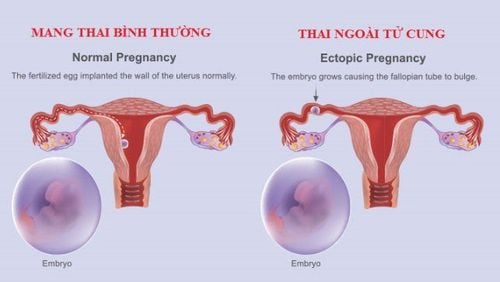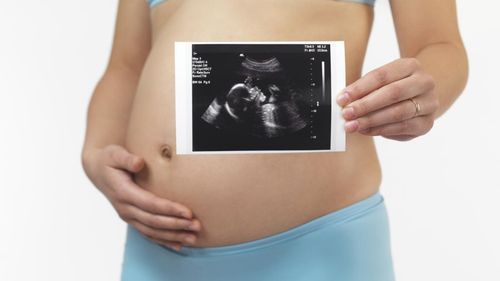This is an automatically translated article.
The article is professionally consulted by Doctor Department of Obstetrics and Gynecology, Vinmec Hai Phong International General Hospital.
At 33 weeks of pregnancy, the length of the fetus is almost stable, the weight continues to increase, the bones develop stronger, the brain shrinks, the vision and immune system continue to improve .
1. Fetal development at 33 weeks of pregnancy
At 33 weeks of pregnancy, the size of your watermelon-sized belly is clear evidence of the long way baby and mother have come together. Weighs in at 2kg, moreover, your baby could double that weight in the coming weeks. By this time, your baby's height is also about 44.1 cm, which is quite close to the length that he will be born.
The fetus is starting to react like a newborn baby. Sensitive to light penetrating the mother's increasingly thinner abdominal wall, eyes drowsy when it's dark and flared when it's morning. These are your baby's first lessons in learning the difference between night and day, a distinction that is obviously very important once he comes out of the womb.

Still playing an important role is the amniotic fluid that surrounds the baby. Amniotic fluid keeps the baby's temperature 1°C warmer than the mother's, so it works to keep the baby warm until the big day. By this time, amniotic fluid is gradually increasing in the womb, creating a cushion between mother and baby.
But now the amniotic fluid is at its highest and the baby is taking up more room in the uterus. As a result, left hooks and karate kicks will be more annoying for mom.
Although it feels like the baby wants to go out, the body is not fully developed yet. Your baby's body is still busy developing an independent immune system, thanks in large part to the antibodies the mother provides through the placenta.
During this week, your baby's bones continue to grow stronger. However, the skull is still soft and flexible because at this time the baby's brain needs to be slightly compressed to get ready to be born. There will still be soft spots in your baby's skull for the first few years after birth to allow the brain to continue to develop.
Trắc nghiệm: Bạn có hiểu đúng về dấu hiệu mang thai sớm?
Các dấu hiệu mang thai sớm không phải chỉ mỗi trễ kinh mà còn có rất nhiều dấu hiệu khác như xuất huyết âm đạo, ngực căng tức,… Điểm xem bạn biết được bao nhiêu dấu hiệu mang thai sớm thông qua bài trắc nghiệm này nhé!
2. Pregnancy symptoms encountered at 33 weeks of pregnancy
Strong fetal movements
Pregnant women can check fetal movements twice a day - in the morning and in the evening. Check the clock and start counting each shake, roll, kick and slap until it reaches 10. If by the end of the hour you feel a lot of movement, have a snack or juice, lie down and rest for a while. Your baby is in need of extra energy.
Varicose veins
If pregnant women are worried that varicose veins affect aesthetics and cause pain, they can rest assured. Because if you don't have this symptom before you get pregnant, it will go away soon after you give birth.
Round ligament pain
If your abdomen hurts when you change positions or wake up suddenly, you may have round ligament pain. You don't need to worry much if it happens only occasionally, there is no fever, chills or bleeding when it hurts, then there is nothing to worry about.
Nail changes
Pregnancy hormones can make nails grow faster but can also make them brittle. If nails are brittle, try getting more biotin in your diet (bananas, avocados, nuts, and whole grains) and try gelatin capsules, which are safe during pregnancy.
Details of fetal development week by week, every parent should learn:
Difficulty breathing
The growing belly can affect the lungs of pregnant women. It is more annoying to the mother than to the baby. The best way to improve is to keep an upright posture to increase oxygen supply to the lungs.
Clumsiness
A bigger belly means it will be difficult for a pregnant woman to carry out daily activities. Slowing down will make things easier - rushing will only make you clumsier.
Pregnancy brain
Brain fog (amnesia) that can be caused by baby's sex. Women who are pregnant with girls are often more forgetful than boys.
Braxton Hicks Contractions
These contractions are often felt by mothers who have experienced one pregnancy. Even at the highest intensity, changing positions (from sitting to lying down, from lying down to walking) will usually make the spasm go away.

3. Things to do in the 33rd week of pregnancy
Coping with Insomnia With hormonal changes, baby's nocturnal activity, leg cramps, heartburn and a belly big like a basketball, it's no wonder moms have trouble sleeping. Insomnia during pregnancy occurs in about three-quarters of pregnant women (who may also face anxiety about an impending birth and a mind that spends the night rummaging through a to-do list in advance. at birth). At 33 weeks pregnant, your body needs rest, so remember that worrying about it won't help. Instead, do your best to be comfortable - before and during bed. Try taking a warm bath and drinking a glass of warm milk before entering, avoid exercising, eating or drinking too close to bedtime, and massage your body. If sleep still bothers you, read a book or listen to soothing music until you fall asleep.
Eat foods rich in omega-3 fatty acids Studies show that a diet high in omega-3 fatty acids (DHA) found mainly in fish oil has advantages for your baby's early development. DHA is important for brain and vision development - and almost all of a baby's DHA accumulation occurs during the last 3 months. DHA may also help prevent preterm labor and protect against postpartum depression. In fact, the FDA recommends eating 8 to 12 ounces (two average meals) a week of a variety of cooked fish and shellfish that are low in mercury, such as shrimp, tilapia, snapper, salmon, and trout. pollock and catfish. Stay away from fresh swordfish, shark and tuna, which are more likely to contain toxins. Other sources of DHA include algae- and egg-based DHA supplements, available in most supermarkets - or try these omega-3-rich and pregnancy-friendly recipes.
Add more Calcium If milk leaves a sour taste in the mouth, there are still many other ways to add calcium to the body. You can mix milk into smoothies or soups, or skip milk altogether and still provide calcium in the form of other dairy products. Most dairy products are high in calcium — especially yogurt (one cup has the same amount of calcium as one cup of milk) and cheese (1 ounce, or 1/4 cup of ground serves one serving). Or can be replaced with juice (orange, grapefruit, apple, cranberry,...) or calcium-rich soy milk and cheese. Remember that skipping dairy means not only calcium deficiency, but also vitamin D deficiency. Yogurt and cheese can be good sources of calcium, but they don't contain much vitamin D. Fortunately, vitamin D can be obtained from the absorption of sunlight for several minutes a day (the body produces it in response to sunlight).
Reduce upset stomach If your body has trouble producing enough lactase - the enzyme that breaks down the lactose in milk - that can lead to cramps, gas, bloating and diarrhea. Besides buying unsweetened milk or taking lactase capsules with milk, try these tips to get the calcium you need without an upset stomach:
Natural hard cheeses like cheddar, Parmesan and Swiss Syrup loses more than half of its lactose during processing. The good bacteria in yogurt (and in some frozen yogurts) work to break down the lactose. Cut down on dairy: Try drinking only half a cup of milk at a time or sipping on a thin slice of cheese or mixing milk with whole grains... the last 3 months of pregnancy, especially from 34 weeks on, The health of both mother and baby needs to be closely monitored and checked. Pregnant women need:
Know the real signs of labor to get to the hospital in time, affecting the health of the fetus. Differentiate between amniotic fluid and vaginal discharge for timely treatment to avoid premature birth, fetal distress, and stillbirth. Be especially careful when bleeding in the last 3 months of pregnancy needs urgent emergency care to ensure the life of both mother and baby. Monitor the amount of amniotic fluid regularly and continuously. Monitor fetal weight in the last 3 months to assess baby's development and predict possible risks at birth. The special monitoring group is the same as the striker, and the fetal growth retardation needs to be closely monitored by the doctor and given appropriate indications. Distinguish between physiological contractions, labor contractions and mechanical pregnancy to get to the hospital in time. Maternity service package at Vinmec helps pregnant women's pregnancy become lighter and safer. During pregnancy, pregnant women will be examined by top doctors in the Obstetrics and Gynecology Department with high professional qualifications and experience, giving the best advice and treatment for the health of both mother and child. little.
For detailed information about all-inclusive maternity service packages, please contact the hospitals and clinics of Vinmec Health system nationwide.
Please dial HOTLINE for more information or register for an appointment HERE. Download MyVinmec app to make appointments faster and to manage your bookings easily.
Reference source: Webmd.com; Babycenter.com.
Recommended video:
Instructions for rolling a nest for babies, helping them feel like in the womb













